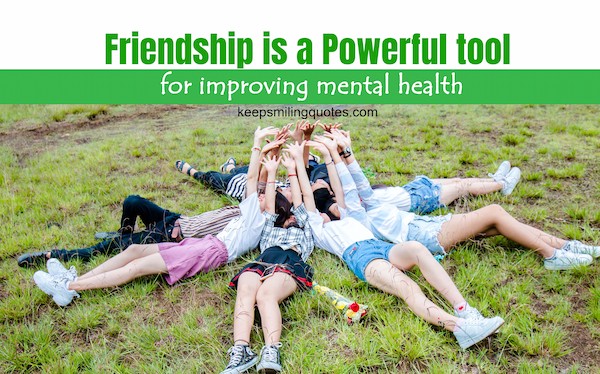Friendship is one of the most essential components of human life. We all desire to have good friends, to be liked, appreciated, and respected by others. Strong bonds with friends have a significant impact on our well-being, and studies have shown that they are just as important as good nutrition, exercise, and getting enough sleep.
Friendship is a vital aspect of our mental, physical, and emotional health. It is not just a source of joy and happiness but also provides numerous benefits for our well-being. For instance, having close friends has been linked to a reduced risk of depression and anxiety, as well as lower levels of stress and improved immune function.

The importance of friendship is especially evident in times of crisis. When people face challenging life circumstances, such as the loss of a loved one, illness, or financial difficulties, having good friends to rely on can make all the difference. Strong bonds of friendship can provide emotional support, a listening ear, and practical assistance that can help individuals cope with difficult situations.
Friendship also plays a significant role in promoting healthy behaviors. Research shows that people who have strong social connections are more likely to engage in healthy behaviors such as exercise, healthy eating, and avoiding harmful substances like drugs and alcohol. Friends can provide encouragement, motivation, and accountability, making it easier for individuals to maintain healthy habits.
Furthermore, friendship can be a powerful tool for improving mental health. Many people who struggle with mental health conditions such as anxiety and depression report feeling isolated and alone. Having friends who understand and support them can be a lifeline, providing a sense of belonging and validation. Friends can also offer a fresh perspective on problems and help individuals reframe negative thoughts and emotions.

Friendship can be a source of inspiration and personal growth as well. When people surround themselves with positive, supportive friends, they are more likely to pursue their goals and achieve success. Friends can provide guidance, feedback, and constructive criticism that can help individuals learn and grow. Additionally, friends can introduce new experiences and perspectives, expanding an individual’s horizons and providing opportunities for personal development.
Creating strong bonds of friendship requires effort, commitment, and vulnerability. It requires investing time and energy into building and maintaining relationships. However, the benefits of having close friends are well worth the effort. Here are a few tips for building and strengthening friendships:
- Be authentic: Authenticity is key to building strong bonds of friendship. Be honest and open with your friends, and share your thoughts and feelings. Be willing to be vulnerable and share your struggles, as this can deepen connections and build trust.
- Show up: Consistency is essential in friendship. Make an effort to show up for your friends, even when it’s inconvenient or challenging. Attend their events, celebrate their accomplishments, and offer support during difficult times.
- Listen actively: Good listening skills are crucial in building strong friendships. Practice active listening by giving your full attention to your friends when they are speaking. Show empathy and understanding, and ask thoughtful questions to deepen your understanding.
- Communicate effectively: Effective communication is essential for maintaining healthy friendships. Be clear and direct in your communication, and avoid passive-aggressive or manipulative behavior. Address conflicts respectfully and honestly.
- Prioritize quality time: Building strong bonds of friendship requires spending quality time together. Make an effort to prioritize time with your friends, whether it’s through shared hobbies, outings, or simply spending time together.
In conclusion, friendship is an essential component of our well-being. Strong bonds of friendship provide emotional support, promote healthy behaviors, and contribute to personal growth and development. While building and maintaining friendships requires effort and vulnerability, the benefits are well worth it. By prioritizing authentic connection, consistent effort, active listening, effective communication, and quality time, we can build strong bonds of friendship that contribute to a happy and healthy life.
Moreover, the positive effects of friendship are not limited to individual well-being. Strong social connections also benefit communities and society as a whole. Communities with strong social networks are more resilient in times of crisis and have lower rates of crime and violence. Social support networks can provide a safety net for vulnerable populations, and strong social connections can promote civic engagement and social cohesion.
Unfortunately, despite the many benefits of friendship, many people struggle to build and maintain strong social connections. The rise of social media and digital communication has made it easier to connect with others, but these connections often lack the depth and authenticity of in-person relationships. Furthermore, many people struggle with social anxiety, fear of rejection, or difficulty trusting others.
To overcome these challenges, it’s important to prioritize building and maintaining strong friendships. This may require stepping outside of our comfort zones, being vulnerable, and taking the initiative to connect with others. Joining clubs, organizations, or community groups can provide opportunities to meet like-minded individuals and build meaningful relationships. Volunteering or participating in activities that align with our interests can also help us connect with others who share our values.
In addition to these proactive steps, it’s important to cultivate a mindset of kindness, compassion, and empathy. When we approach others with genuine interest and a desire to connect, we are more likely to build strong and lasting relationships. Furthermore, when we show kindness and support to our friends, we create a positive cycle of mutual caring and reciprocity.
In conclusion, friendship is a vital aspect of our well-being and contributes to a happy and fulfilling life. Strong bonds of friendship provide emotional support, promote healthy behaviors, and contribute to personal growth and development. By prioritizing authenticity, consistency, active listening, effective communication, and quality time, we can build strong connections that benefit ourselves, our communities, and society as a whole. So let’s make the effort to invest in our friendships and enjoy the many benefits they bring to our lives.
It’s important to note that while friendship can have many positive effects on our well-being, it’s not a cure-all for mental health issues. People experiencing mental health challenges should seek professional support and treatment in addition to building strong social connections. However, having a supportive network of friends can complement professional treatment and provide additional emotional support.
Furthermore, while building and maintaining friendships can be challenging, it’s important to remember that it’s a two-way street. It’s important to not only invest in our own relationships but also to be a supportive and caring friend to others. By showing up for our friends, being a good listener, and providing emotional support, we can help create a positive cycle of mutual care and support.
In addition, it’s important to acknowledge that friendships can also experience challenges and conflicts. It’s normal for friends to disagree or experience misunderstandings, and these conflicts can be an opportunity for growth and learning. However, it’s important to address conflicts respectfully and honestly, and to work towards finding solutions that are mutually beneficial.
In conclusion, strong bonds of friendship are an essential component of our well-being. They provide emotional support, promote healthy behaviors, and contribute to personal growth and development. By prioritizing authenticity, consistency, active listening, effective communication, and quality time, we can build strong connections that benefit ourselves, our communities, and society as a whole. Let’s make the effort to invest in our friendships and enjoy the many benefits they bring to our lives.
When we love our friends from the heart
When we love our friends from the heart, we cultivate a deeper, more meaningful connection that enriches our lives and contributes to our well-being. This kind of love goes beyond surface-level interactions and requires a commitment to authenticity, vulnerability, and mutual support.
One of the key aspects of loving our friends from the heart is authenticity. When we are genuine and honest in our interactions, we create a safe space for our friends to do the same. This means being willing to share our own struggles and vulnerabilities, and creating an environment where our friends feel comfortable doing the same. By showing up as our true selves, we build trust and mutual respect in our friendships.
In addition, loving our friends from the heart requires a willingness to show up consistently, even when things are difficult. This means being there for our friends during both good times and bad, listening without judgment, and offering support and encouragement even when it’s not convenient or easy. It means prioritizing our friendships and making time for quality interactions, even when we’re busy or stressed.
Another important aspect of loving our friends from the heart is active listening. When we truly listen to our friends, we show that we value and care about their thoughts and feelings. This means being fully present in our interactions, asking questions, and reflecting back what we hear to show that we understand and empathize. By listening actively, we can deepen our understanding of our friends and strengthen our connection with them.
It’s also important to note that loving our friends from the heart doesn’t mean that we have to agree with everything they say or do. True friendship involves honest communication and constructive feedback, and it’s okay to respectfully disagree or offer a different perspective. By approaching conflicts with kindness and understanding, we can work through challenges and grow closer in our friendships.
In conclusion, loving our friends from the heart requires a commitment to authenticity, vulnerability, and mutual support. By showing up consistently, listening actively, and offering support and encouragement, we can build strong and lasting friendships that enrich our lives and contribute to our well-being. So let’s make the effort to love our friends from the heart, and enjoy the many benefits of true friendship. Heart Touching
Making new friends can be scary, especially if you’re shy. But you can become friends with anyone in under an hour if you follow some easy steps. First, ask them about themselves and listen carefully to their answers. Second, find things you have in common to talk about. Third, be honest about yourself, too. Fourth, stay positive and show that you’re interested in spending time with them. Lastly, plan to hang out again in the future. By doing these things, you can make new friends quickly and have fun doing it!
Also Read Become Close Friends with Anyone in Less than 60 Minutes



